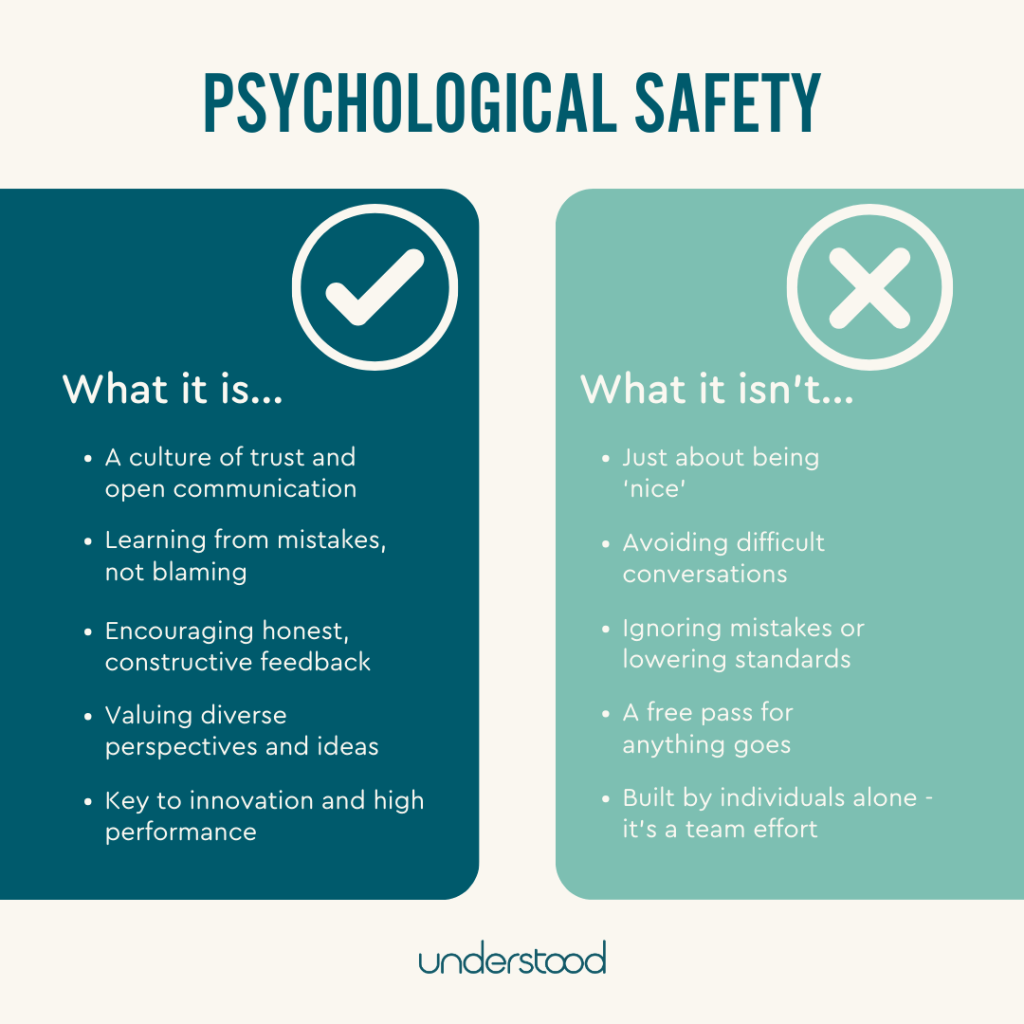
Psychological safety: The key to high-performing teams
By Carolyn Quainton in Behaviour, Communication, Emotional Intelligence, Leadership
Have you ever sat in a meeting and hesitated to share an idea, afraid it might sound silly? Or kept quiet about a mistake because you feared the consequences? If so, you’ve experienced what it feels like to work without psychological safety.
But what does psychological safety really mean, and why does it play such a crucial role in workplace culture, leadership, and team performance?
What is psychological safety?
Psychological safety means believing you can speak up, take risks, and admit mistakes—without facing blame or embarrassment. It creates a work environment where people feel valued, heard, and motivated to share their best ideas.
Harvard Business School professor Amy Edmondson coined the term while researching hospital teams. Interestingly, she found that the best teams didn’t necessarily make fewer mistakes—they were just more open about discussing them. This willingness to share and learn led to better teamwork, innovation, and overall success.
“It’s felt permission for candor.” – Amy Edmondson
You can read more about her insights in the Harvard Business Review article: What Is Psychological Safety?
Why does psychological safety matter in the workplace?
Research, including Google’s Project Aristotle, shows that psychological safety is the most important factor in high-performing teams, more important than skills, experience, or team structure.
When employees feel psychologically safe, they:
Share ideas freely, sparking creativity and better problem-solving
Learn from mistakes instead of covering them up
Stay engaged and feel valued, which boosts morale and retention
Make sound decisions by welcoming diverse perspectives
Without this teams risk low engagement, high stress, poor decision-making, and a fear-based culture, none of which lead to long-term success.
How can leaders create psychological safety?
Leaders play a vital role in building a safe workplace. While change takes time, leaders can take practical steps to create a culture where people feel supported and empowered:
- Encourage openness – Ask questions like What are your thoughts? or How do you see this situation?
- Model vulnerability – Admit mistakes and show that learning from failure is part of growth.
- Respond positively – Replace blame with curiosity: What did we learn? instead of Who’s at fault?
- Show that every voice matters – Recognise contributions and ensure quieter team members are heard.

Common myths
“It’s just about being nice”
Not true. Some overly “nice” workplaces actually stifle psychological safety, because people avoid challenging ideas. Real psychological safety allows for honest, constructive dialogue, even when it feels uncomfortable.
“It’s about making people feel comfortable all the time”
Not exactly. Growth, learning, and innovation often feel uncomfortable, but psychological safety ensures that discomfort builds confidence, not fear.
Creating a culture of learning and trust
At Understood, we specialise in leadership development, workplace culture, and team performance training. If you want to build a high-performing, psychologically safe workplace, our bespoke training programmes can help your leaders and teams develop the skills to thrive in today’s workplace.
Talk to us, explore our website, read our blog, and follow us on LinkedIn to learn more and discover ways to grow a more successful business.


